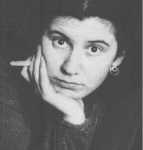Etty Hillesum was a Dutch Jew born on January 15, 1914. On September 7, 1943, following a deportation order, she  boarded a train bound for Poland. The journey was to last three days. Before finally leaving the Netherlands she threw a postcard from the train. It was found and mailed by some farmers. It read, “We left the camp singing.” Etty and the others arrived in Auschwitz on September 10, 1943. That same day her mother and father were gassed. The Red Cross reported Etty’s death on November 30, 1943.
boarded a train bound for Poland. The journey was to last three days. Before finally leaving the Netherlands she threw a postcard from the train. It was found and mailed by some farmers. It read, “We left the camp singing.” Etty and the others arrived in Auschwitz on September 10, 1943. That same day her mother and father were gassed. The Red Cross reported Etty’s death on November 30, 1943.
I first learned of Etty Hillesum in the third lecture of this year’s Holy Week lectures by Archbishop Rowan Williams. Her diary and letters have been published in a book entitled An Interrupted Life. Etty began her diary at the age of twenty-seven. It covers the years 1941-1942. Her diary describes that mysterious process of personal inner growth and liberation, a process that opened her to an optimism that revealed life as beautiful and meaningful. Paradoxically, this becomes most apparent in her entries following Germany’s first major roundup of Dutch Jews in April 1942. Her optimism is not, however, simple wishful thinking or naiveté about the impending circumstance of her life, what she calls “simply props.” Etty has no illusions about the camps saying, “I know that I shall be dead within three days because my body is so useless” (p. 163).
Etty’s optimism is grounded in the greater reality of the interior world as evidenced by the following two excerpts:
- “This morning I cycled along the Station Quay enjoying the broad sweep of the sky at the edge of the city and breathing unrationed air. And everywhere signs barring Jews from the paths and the open country. But above the one narrow path still left to us stretches the sky, intact. They can’t do anything to us, they really can’t. They can harass us, they can rob us of our material goods, of our freedom of movement, but we ourselves forfeit our greatest assets by our misguided compliance. By our feelings of being persecuted, humiliated, and oppressed. By our own hatred. By our swagger, which hides our fear. We may of course be sad and depressed by what has been done to us; that is only human and understandable. However: our greatest injury is one we inflict upon ourselves. I find life beautiful, and I feel free. The sky within me is as wide as the one stretching above my head. I believe in God and I believe in man, and I say so without embarrassment. Life is hard, but that is not a bad thing. If one starts by taking one’s own importance seriously, the rest follows. It is not morbid individualism to work on oneself. True peace will come only when every individual finds peace within himself; when we have all vanquished and transformed our hatred for our fellow human beings of whatever race – even into love one day, although perhaps that is asking too much. It is, however, the only solution. I am a happy person and I hold life dear indeed, in this year of Our Lord 1942, the umpteenth year of the war.” (June 20, 1942, pp. 144-145)
- “And the English radio has reported that 700,000 Jews perished last year alone, in Germany and the occupied territories. And even if we stay alive, we shall carry the wounds with us throughout our lives. And yet I don’t think life is meaningless. And God is not accountable to us for the senseless harm we cause one another. We are accountable to him! I have already died a thousand deaths in a thousand concentration camps. I know about everything and am no longer appalled by the latest reports. In one way or another I know it all. And yet I find life beautiful and meaningful. From minute to minute.” (June 29, 1942, p. 150)
Etty’s self-reflection was not simply individualistic thinking and self-preoccupation. Rather, it was an act of resistance against such things. Etty knew that she not only lived in the world but also that
we carry everything within us, God and Heaven and Hell and Earth and Life and Death and all of history. The externals are simply props; everything that comes: the bad with the good, which does not mean we cannot devote our life to curing the bad. But we must know what motives inspire our struggle, and we must begin with ourselves, every day anew. (July 3, 1942, pp. 154-155)
Etty challenges us to see that exterior changes in the world will come about only as each one of us does our own inner work. To choose that inner work is to choose each other and to choose a different reality. “We should,” she writes as the last line of her diary, “be willing to act as balm for all wounds.” (p. 231)

Leave a comment